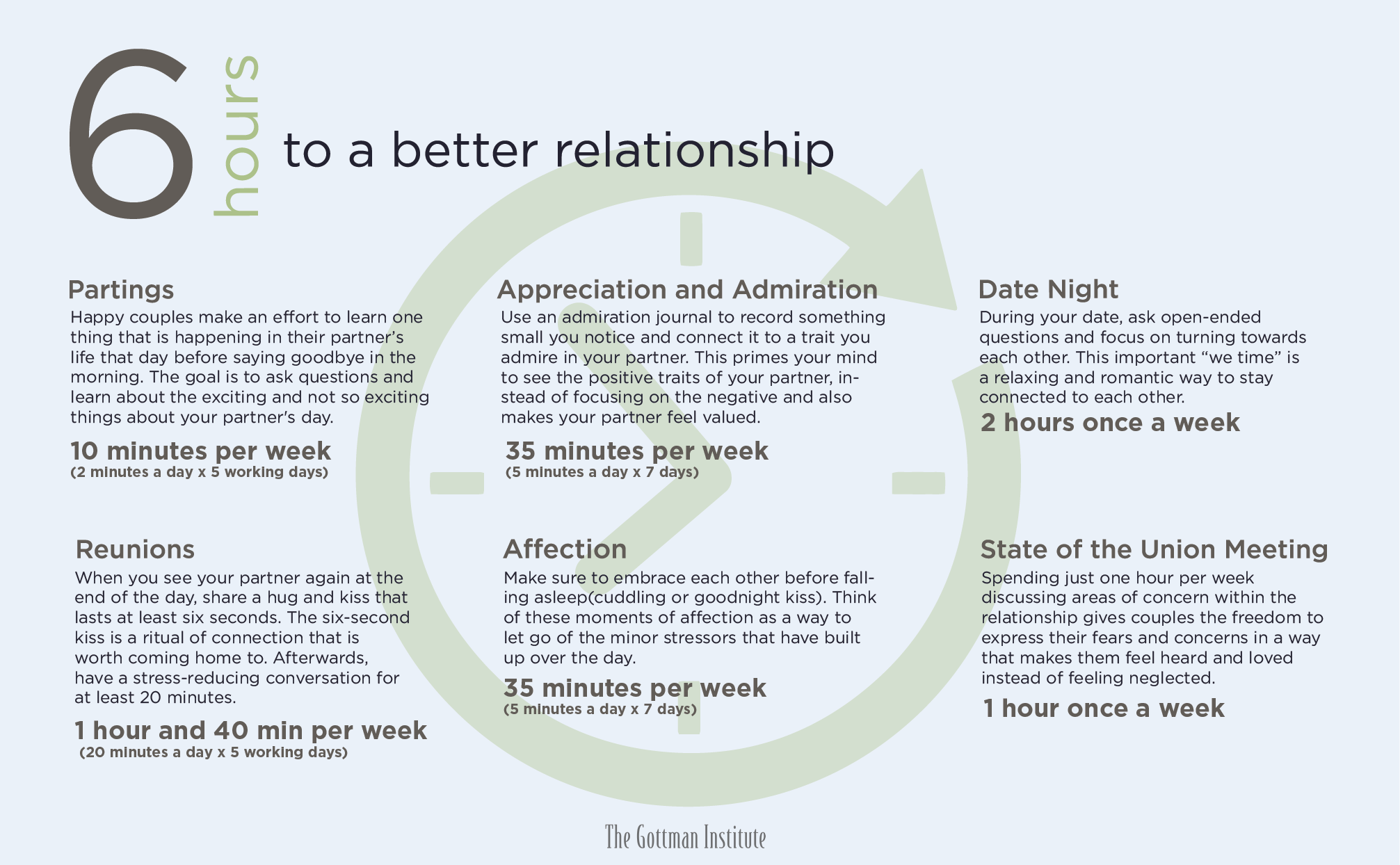All of your relationship problems cannot be solved by reading a book, attending a weekend workshop, or enrolling in couples therapy. With that said, learning what distinguishes happy couples from unhappy ones can change the course of how you and your partner love each other.
The seemingly insignificant shifts in the trajectory of your relationship can have a significant effect over time. The catch is that you have to continue to build on the positive changes you’ve made so you don’t fall back into old, negative patterns.
When we followed up with couples who attended The Art and Science of Love weekend workshop, we asked ourselves, “Is there a the noticeable difference between couples whose marriages continued to improve over time compared to those whose marriages did not?”
You’d think the successful couples would have made a dramatic overhaul in their marriage. This is not what we discovered.
To our surprise, they were only devoting an extra six hours per week to their relationship. How these couples split up these six hours depended on their focus and areas of improvement, but we did notice some clear patterns.
Here’s what the winning formula looks like.
Partings
Happy couples make an effort to learn one thing that is happening in their partner’s life that day before saying goodbye in the morning. This could be lunch plans with a best friend or a doctor’s appointment or a scheduled call with their parents. The goal is to ask questions and learn about the exciting and not so exciting things about your partner’s day.
Time allocation: 10 minutes per week (2 minutes a day x 5 working days)
Reunions
When you see your partner again at the end of the day, share a hug and kiss that last at least six seconds. Dr. John Gottman calls this a “kiss with potential.” The six-second kiss is a ritual of connection that is worth coming home to.
After the six-second kiss, have a stress-reducing conversation for at least 20 minutes. This provides you with a space for empathy and non-sexual intimacy, as well as encourages you to understand the stresses and problems outside of your relationship that you’re both facing.
Time allocation: 1 hour and 40 minutes per week (20 minutes a day x 5 working days)
Appreciation and Admiration
It’s important to find ways to genuinely communicate affection and appreciation toward your partner. I encourage couples that I work with to use an admiration journal, which enables them to record something small they notice and connect it to a trait they admire in their partner.
Not only does this make your partner feel valued, but it also primes your mind to see the positive traits of your partner, instead of focusing on the negative. Here is an example: “Thanks for helping out with the dishes last night and letting me go finish my project for work. You’re such a thoughtful and kind woman.”
Time allocation: 35 minutes per week (5 minutes a day x 7 days)
Affection
Expressing physical affection when you’re together is vital to feeling connected to each other. Make sure to embrace each other before falling asleep. This can be as simple as cuddling for a few minutes or a goodnight kiss.
Think of these moments of affection as a way to let go of the minor stressors that have built up over the day. Imagine lacing your goodnight kiss with forgiveness and tenderness for your partner.
Time Allocation: 35 minutes a week (5 minutes a day x 7 days)
Date Night
This important “we time” is a relaxing and romantic way to stay connected to each other.
During your date, ask open-ended questions and focus on turning towards each other. Think of questions to ask your partner, such as, “Are you still thinking about redesigning the bathroom?” or “I’d love to take a vacation with you. Do you have any places in mind?” or “How has your boss treated you this week?”
Time allocation: 2 hours once a week
State of the Union Meeting
Dr. Gottman’s research revealed that spending just one hour per week discussing areas of concern within the relationship has shown to transform the way partners manage conflict. In my practice, I notice this dedicated space to discuss conflict gives couples the freedom to express their fears and concerns in a way that makes them feel heard and loved instead of feeling neglected.
I’d recommend this become a weekly ritual in your relationship that happens at the same time each week. It’s sacred time because it’s transformative, even though it may not feel fun in the moment.
Here’s how to do it: Start by talking about what has gone well in your relationship since the last meeting. Next, give each other five appreciations you haven’t yet expressed. Try to be specific and include examples. Now, discuss any issues that may have arisen in the relationship. To make the conversation effective, take turns being the speaker and the listener.
As the speaker, use gentle start-ups that avoid triggering your partner. As the listener, try to truly understand what your partner is saying without judgement. If you get defensive or flooded, take a 20-minute break and return to the conversation.
After both partners feel understood and heard by each other, move to problem solving with the two-circle method described on page 185 in “The Seven Principles For Making Marriage Work.” If a regrettable incident happened during the week, process it using the exercise on page 188. At the end of the conversation, each partner needs to ask and answer, “What can I do to make you feel loved this coming week?”
Time allocated: 1 hour a week.
Grand total: 6 hours!

You can download a free PDF version of the 6 hours to a better relationship here.
As you can see, six hours a week is quite minimal. In fact it’s only 5% of your waking life if you sleep 8 hours each night. As insignificant as these six hours may feel, they will help enormously in keeping your relationship on track.






